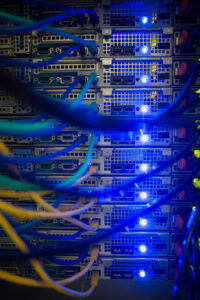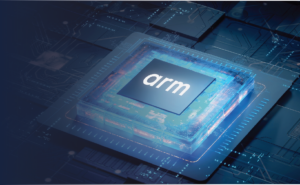
Adonay Berhe
Product Marketing
As the adoption of Artificial Intelligence (AI) technology continues to expand across numerous industries, the importance of maintaining a reliable and efficient server infrastructure becomes increasingly crucial. The Baseboard Management Controller (BMC) firmware presents a substantial component that can significantly enhance the management of these AI servers. Let’s explore the significance of integrating the BMC firmware into current and future AI server frameworks. I will highlight the numerous benefits of this integration and provide vital insights into its implementation.
AI applications often require powerful hardware setups comprising high-performance servers with heterogenous workload accelerators that handle complex computational tasks. To ensure optimal performance, reliability, and manageability of these servers, integrating a comprehensive BMC solution is essential. This firmware empowers IT administrators with various capabilities and tools to monitor, control, extend, and maintain AI server infrastructure effectively.
Advantages of BMC for AI Server Infrastructure
- Remote Server Management: BMC enables remote server management, allowing administrators to monitor and control AI servers from anywhere. This feature is particularly beneficial when deploying AI infrastructure across multiple locations or cloud-based environments. Administrators can access and manage the servers remotely through a secure network connection, ensuring uninterrupted performance, timely updates, proactive maintenance and event handling, and effective error logging.
- Comprehensive Hardware Monitoring: AI servers often comprise numerous components, including processors, accelerators (GPUs, DPUs, FPGAs, XPUs, etc.), memory modules, storage drives, and networking interfaces. BMC solutions offer compressive Out-of-Band (OOB) manageability features and add-on technologies in the form of Technology Packs (TPs) and Expansion Packs (EPs), providing real-time insights into the server’s health status. With enhanced support for key platform interfaces (IPMI, Redfish, SNMP, MCTP, I2C, etc.) and platform components (NIC, Storage, RAID, GPU, etc.), data center administrators can monitor critical parameters, optimize server performance, and mitigate issues by promptly identifying anomalies, preventing system downtime, and improving debuggability.
- Intelligent Power Management: Efficient power management is essential in AI server infrastructures due to high energy consumption. BMC allows administrators to monitor power consumption at the server, chassis, and component levels. Features such as power and thermal optimization and others facilitate power capping, ensuring that power limits are not exceeded and allowing for effective power distribution across the infrastructure. These features help optimize energy usage and reduce operating costs and environmental impact.
- Robust Security Measures: With the increasing value of AI systems and the sensitive data they handle, robust security measures are critical. BMC can provide a range of security features, such as secure boot, secure firmware updates, and authentication mechanisms. Furthermore, native integration with Platform or Hardware Root of Trust solution enforces NIST-compliant security protocols to protect, detect, and recover platform firmware. These ensure the integrity and authenticity of the platform and components’ firmware, protecting against unauthorized access and mitigating the risk of cyber threats or data breaches.
- Efficient Troubleshooting and Diagnostics: In the event of server issues or failures, BMC offers advanced troubleshooting and diagnostics capabilities. Administrators can remotely access the server’s console, view system logs, and perform comprehensive hardware diagnostics to identify the root cause of problems lowering triage time. Rapid identification and resolution of issues minimize downtime and increase the overall availability of AI server infrastructure.
Implementing BMC Firmware for AI Server Infrastructure
Integrating BMC into AI server infrastructure requires collaboration with an experienced BMC firmware vendor or their authorized partners. The implementation process typically involves the following:
- Hardware Compatibility Assessment: Evaluating the desired platform (reference board) and BMC hardware to ensure compatibility with BMC firmware support roadmap.
- Platform Porting: Applying customizations to tailor the firmware features and configurations to align with the specific requirements and policies of the AI server infrastructure. This process enables remote management and monitoring capabilities while validating the full functionality of the BMC firmware.
- Training and Support: Providing training to administrators on utilizing the full capabilities of BMC firmware and ensuring ongoing technical support to address any queries or issues that may arise.
AMI’s MegaRAC BMC Manageability Solution Meets the Needs
If your organization is seeking to maximize the potential of its AI infrastructure, investing in an advanced server manageability solution like AMI’s MegaRAC BMC solution is indispensable. With remote server management, comprehensive hardware monitoring, intelligent power management, robust security measures, and efficient troubleshooting, MegaRAC empowers enterprises to optimize AI server performance and minimize system downtime. This, in turn, significantly enhances infrastructure throughput, security, and reliability in the modern-day data center.
To learn more about AMI’s MegaRAC BMC Manageability solutions, contact AMI Sales and download MegaRAC OneTree datasheet.






